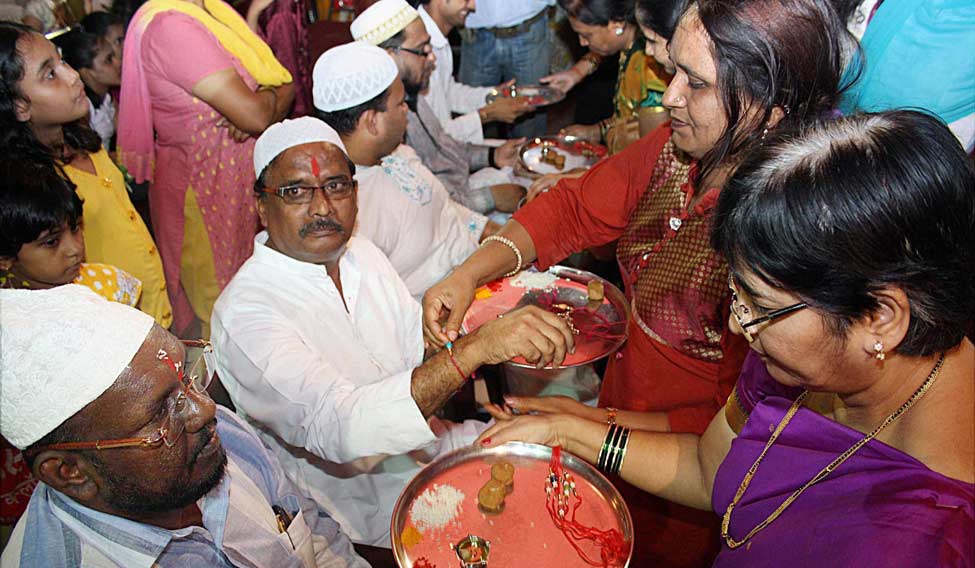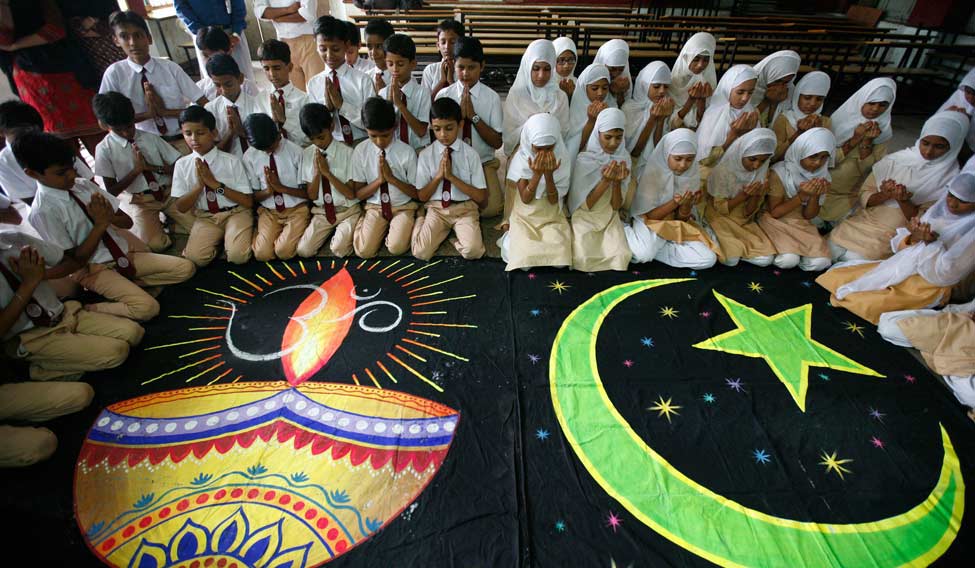Equality is the heart of Indian Constitution. Though inequalities, disparities and differences are existing and widening because of lopsided policies of the successive governments, the equality continues to be the objective and aim of the constitutional governance. Secularism is one facet of equality among the people of all religions, which cannot be tinkered with. Secularism is the basic character of our well-drafted Constitution, besides democracy.
Additions in Preamble
The amendment of the Constitution during Emergency by Indira Gandhi government to introduce the word 'secular' in the Preamble does not mean that we were not a secular nation earlier. And India did not become 'socialist' because it was added by this amendment. It can be read as a reiteration of the principle of equality of people without discrimination on any ground including the religion, gender or caste. Though there is no specific declaration even before this amendment, the Indian Constitution has implicitly recognised secularism by guaranteeing the right to equality before the law and equal protection of law under Article 14, which is fundamental. This principle was reinforced by Article 15 that says state shall not discriminate against any citizen on grounds only of religion, race, caste, sex, place of birth or any of them. Its sub-articles further explain it with examples. Article 16 is yet another declaration about equality of opportunities in matters of public employment wherein again the discrimination based on religion was specifically prohibited. Other fundamental rights under Article 19, extend to every citizen without any discrimination. The all important right to life (Article 21) with other related fundamental rights under Article 20 and 22 will extend to all persons equally. Any law that abrogates this feature is unconstitutional.
Apart from these rights, Articles 25 to 30 secured right to freedom of religion (A25), freedom to manage religious affairs (A26), freedom as to payment of taxes for promotion of any particular religion (A27), freedom as to attendance at religious instruction or religious worship in certain educational institutions (A 28), protection of interests of minorities (A29) and right of minorities to establish and administer educational institutions (A30). Religious institutions, charities and trusts are part of the concurrent list in the seventh schedule of the Indian Constitution; both the Centre and states can legislate on these matters. This facilitated interferences by the states into the religion.
No official religion of state
Since its inception in 1950, Indian state (under Constitution) did not proclaim any religion as 'state' religion. India is a union of states; it is neither Hindu Desh nor Union of Hindu States as per Constitution. We will not find the word “Hindu” in the entire Constitution. The founding fathers of Indian Constitution preferred to call Bharath but not Hindu. Bharath does not indicate any religion but 'Hindu' obviously refers to a religion of majority. Our Constitution has designed governance structure based on political parties without mentioning the word 'political party' and prescribed people to include all including majority Hindus without mentioning the name. Religion though indicates community, is a personal matter. That is why law of marriage and succession is called personal law. Though people should be treated same, their religious practices can be different. In fact, each caste or sub-caste or branch of that might have their own unique customs or practices in matters of marriage, divorce, inheritance etc. These practices are also part of language and culture and hence they are protected and recognised as distinct from others. There should be a uniform penal code like IPC, but it is difficult to have a uniform civil code in India with varieties of customs recognised jurisprudentially as sources of law. A very important point to be remembered is that any religious practice or custom that breaches fundamental rights has no place in Rule of Law as envisaged by our Rule Book.
Peculiar Secularism
Secularism in western states means strict separation of state from religion. The state can exercise its political authority over the territory but each individual is free to pursue his or her own religion and the right of religion to shape own concepts of spirituality. He has a right to convert himself and others to different religion. Faith is personal. In India, state interferes in each and every religion and it is prescribed that each religion has to be treated equally. Hence, secularism here means equal treatment, equidistance with every religion under law, not the 'separation' from state. It totally differs from that of France. There is strictly no religion in governmental institutions and no question of government being in any religious affairs of France. In India, the government controls the management of the richest Tirumala Tirupati Devasthanams (and many others), appoints its officers, staff, chairman and managing board members. Government keeps Hundi in temples and takes a share from its proceeds. It appoints bureaucrats in temple administration and charges their salaries on temple Hundi. Government controls the fund collected from contribution of temples and design policies to spend it. Religious and Charitable Endowment Act 1951 allows state governments to forcibly take over, own and operate Hindu temples, and collect revenue from offerings and redistribute that revenue to any non-temple purposes including maintenance of religious institutions opposed to the temple. It provides financial support to religious schools and accepts religious law over the governmental institutions. Partial financial support is given to Islamic religious schools. Government supports, regulates and administers the historic Hindu temples, Budhist monasteries and certain Christian religious institutions. This will not happen in western 'secularism'. Though Constitution of India talks of secularism, different laws created inequality among places of worship of different religions.
Deep rooted differences
Islamic rulers’ Shariat-based jurisprudence subjecting Hindus to discriminatory taxation, encroachment of temples to build Masjids over them and British politics are historic causes of deep rooted hostilities between these two communities. Except Akbar, equality of religions was nobody’s policy during Delhi and Deccan Sultanats. India was not secular before the advent of British administration, which used the division between Hindus and Muslims to perpetuate their rule till independence, claiming secularism as neutrality to all religions. The British introduced and encouraged Indian Christians and made laws for them like Indian Succession Act and Special Marriage Act of 1872.
 [FILE] Hindu women tying Rakhi to Muslim men during Raksha Bandhan celebrations in Mumbai | PTI
[FILE] Hindu women tying Rakhi to Muslim men during Raksha Bandhan celebrations in Mumbai | PTI
Politics of secularism
Politically the secularism is just a slogan, policy or manifesto. While some political parties were criticized as pseudo secularists for pampering or appeasing the Muslims in the name of ‘equality of religions’ or protection of minorities, some other parties are blamed for communal tensions by sectarian tendencies. What appears common among them is that everything is for power. People are treated as vote banks and not as human beings. If a group gets into a solid vote-bank, their voice alone is being heard. Every political party is trying to build their own vote banks with people amenable or vulnerable to form into solid groups.
Legal inequalities among women
In Shah Bano case the Supreme Court upheld on February 3, 1981, the secular values of Indian Constitution by validating the required maintenance to ex-wives of Muslims under common provision of S 125 of CrPC. The then government passed the Muslim Women (Protection of Rights on Divorce) Act 1986 undoing that land mark order, denying all Muslim women their right to maintenance, while women in other religions are entitled to. Another secular ruling of Supreme Court recently is holding practice of triple talaq as unconstitutional because it breached Article 14. The Government has proposed a bill to prohibit and criminalise triple talaq. The bill has already been passed by Lok Sabha and awaiting to be placed before the Rajya Sabha. Significant positive features of the bill are that it mandated the substantive maintenance to wives divorced by this unconstitutional practice, custody of children and declared such instant divorce as invalid. The Muslim Women (Protection of Rights on Marriage) Bill 2017 will exclusively deal with complaints against instant triple talaq. Section 2(b) defined "talaq as talaq-e-biddat or any other similar form of talaq having the effect of instantaneous and irrevocable divorce pronounced by a Muslim husband”. Because it says 'similar', it may not cover all kinds of divorces practiced in Muslims and hence it may not extend to all Muslim wives. For the other ex-wives of Muslims “the Muslim Women (Protection of Rights on Divorce) Act, 1986” which nullified secular ruling of Supreme Court in Shah Bano, might apply. This 2017 bill has no provision to repeal or replace the 1986 Act. This might give rise to two classes of Muslim women: 1) those divorced by triple talaq getting substantive maintenance, 2) Muslim women divorced by other methods of divorce, under 1986 Sha Bano legislation. Combined effect of these two legislations is: the most of Muslim women continue to be not entitled to maintenance by law, and Muslim men would go to jail for triple talaq! This will not ensure equality among Muslim women and also among women of all religions. The secular laws in Section 125 of Code of Criminal Procedure and Protection of Women from Domestic Violence Act, 2005 should be made applicable to all women without any discrimination based on religion.
Equality is life of Indian Constitution
As long as right to life and right to equality are not diluted, India remains secular by law in spite of certain legal inequalities. Mere deletion of the word 'secular' from Preamble will not remove secularism from India. But as long as women of different religion face discrimination, and laws that discriminate places of worship exist, the claim of secularism cannot be genuine. Indian Constitution becomes secular only if that missing equality is introduced. Any amendment to remove word 'secular' or making it a Hindu state alone will not bring the needed equality. The comments of a minister on this aspect might have stirred up a controversy but it is very difficult to tinker the basic structure of our constitution.






